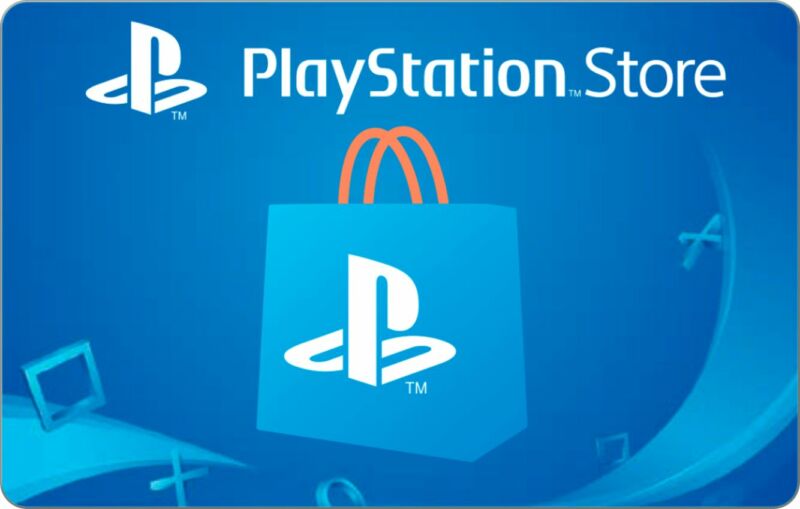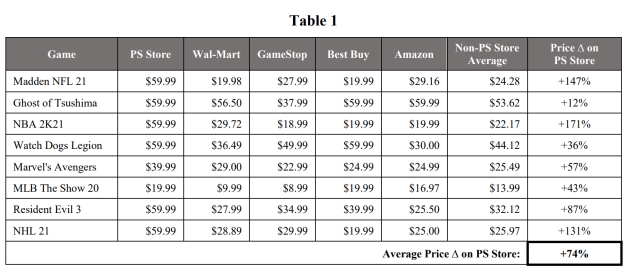
In Apple's opening statements in the Epic Games v. Apple trial on Monday, the company argued that "the law protects Apple's choice to have a closed system, just as it protects Sony and Nintendo." A new proposed class-action lawsuit against Sony's alleged monopoly control over the market for downloadable PlayStation games seems set to test that argument in the near future.
The lawsuit, filed in Northern California federal court (first reported on by Bloomberg News and obtained by Polygon), alleges that Sony's monopoly control over the PlayStation Store leads to "supracompetitive prices for digital PlayStation games, which are... [priced] significantly higher than they would be in a competitive retail market for digital games."
No more retail code competition
Microsoft and Nintendo also maintain digital storefronts that provide the only legitimate way to download software on the Xbox and Switch platforms, of course. But the lawsuit says the PlayStation Store differs from its console competition for a couple of reasons.
For one thing, in 2019, Sony became the only console maker to stop allowing the sale of digital game codes through brick-and-mortar and online retailers. In doing so, the suit alleges, Sony "specifically intended to and did eliminate price competition from other digital video game retailers," limiting players to "a single source for purchasing any digital PlayStation content" and forcing those players "to pay a higher price for digital PlayStation games than they would in a free and unrestrained competitive retail market."The suit suggests that "where download codes are available from outside retailers, the retailers compete amongst themselves and with the in-console stores to offer the best price." That seems somewhat true in other console markets; as of this writing, digital codes for games like Xenoblade Chronicles: Definitive Edition and New Super Mario Bros. U Deluxe are selling for $39.99 on Amazon, less than the $59.99 price for a direct purchase through the Nintendo Online Store.
But the suit doesn't give any similar, pre-2019 examples of digital PlayStation games that were cheaper through retail download codes than through the PlayStation Store itself. Instead, it provides a handful of examples where digital PlayStation titles are currently more expensive than their disc-based counterparts at retail (a phenomenon we've noted in the past on other Sony platforms).
The lawsuit tries to argue that in a truly competitive digital marketplace, downloadable game prices at retailers would be even cheaper than these discs. "There is no legitimate reason digital games should be more expensive than their physical counterparts," the suit says. "In fact, given the costs saved on packaging and distribution, prices for digital games in a truly competitive market would likely be lower than they are for games on disk [sic]."
At the same time, the suit acknowledges that "physical games are not substitutes for digital games" and that an "increase in price for digital PlayStation games will not cause a significant number of consumers to switch to buying physical copies of PlayStation games instead." By that argument, cheaper physical games don't seem like good evidence that the Sony-controlled digital versions of those games are necessarily overpriced.
The suit also says that Sony's pricing controls are particularly pernicious because "consumers continue to switch from disks [sic] to digital games in ever-increasing numbers," with digital sales making up 62 percent of PlayStation sales in 2020. But the fact that consumers are increasingly willing to pay those "monopolistic" prices for digital games again suggests that comparisons to disc-based prices are not that relevant.
Who sets the prices?
The second difference between PlayStation consoles and others, the suit argues, is that PlayStation game publishers "must cede total control over the retail price to Sony."
The suit cites a PlayStation Global Developer and Publisher Agreement filed with the SEC that states local Sony Interactive Entertainment affiliates have "the sole and exclusive right to set the retail price to Users for Digitally Delivered Products sold or otherwise made available for purchase on or through PSN in its territory" and to "modify any Digitally Delivered Product’s retail price at any time without notice to Publisher." This is in contrast to Microsoft and Nintendo, which "allow developers who sell games through their platforms to set the retail price."
It's not clear how often Sony uses this clause to enforce pricing changes on digital PlayStation games or how different Sony's "enforced" prices are from the ones recommended by publishers. Nonetheless, the suit alleges that "Sony foreclosed price competition among video game publishers to a significant degree, because they can no longer execute a strategy of offering lower retail prices to gain a higher share of sales."
Sony has an incentive to keep digital game prices high, the suit argues, because the company incurs the marginal costs of each game download (such as bandwidth fees). By contrast, the suit argues, if publishers controlled digital PlayStation game pricing directly, they "would maximize their profits at a lower price point but greater sales volume, relative to Sony." The end result, the suit alleges, is "reduced output and supply of PlayStation video games" because "lower prices would generate both increased demand and increased supply to meet that demand."
The lawsuit proposes that anyone who has purchased a downloadable game on a PlayStation console since April of 2019 could be party to this suit, and it seeks the usual mix of monetary and injunctive relief to fix Sony's "anticompetitive conduct" and "unlawful monopolization of the relevant market."
The Link LonkMay 08, 2021 at 03:19AM
https://ift.tt/3utGvTB
Sony faces lawsuit over alleged “monopoly pricing” of PlayStation downloads - Ars Technica
https://ift.tt/2ZeUDD8
Sony

No comments:
Post a Comment